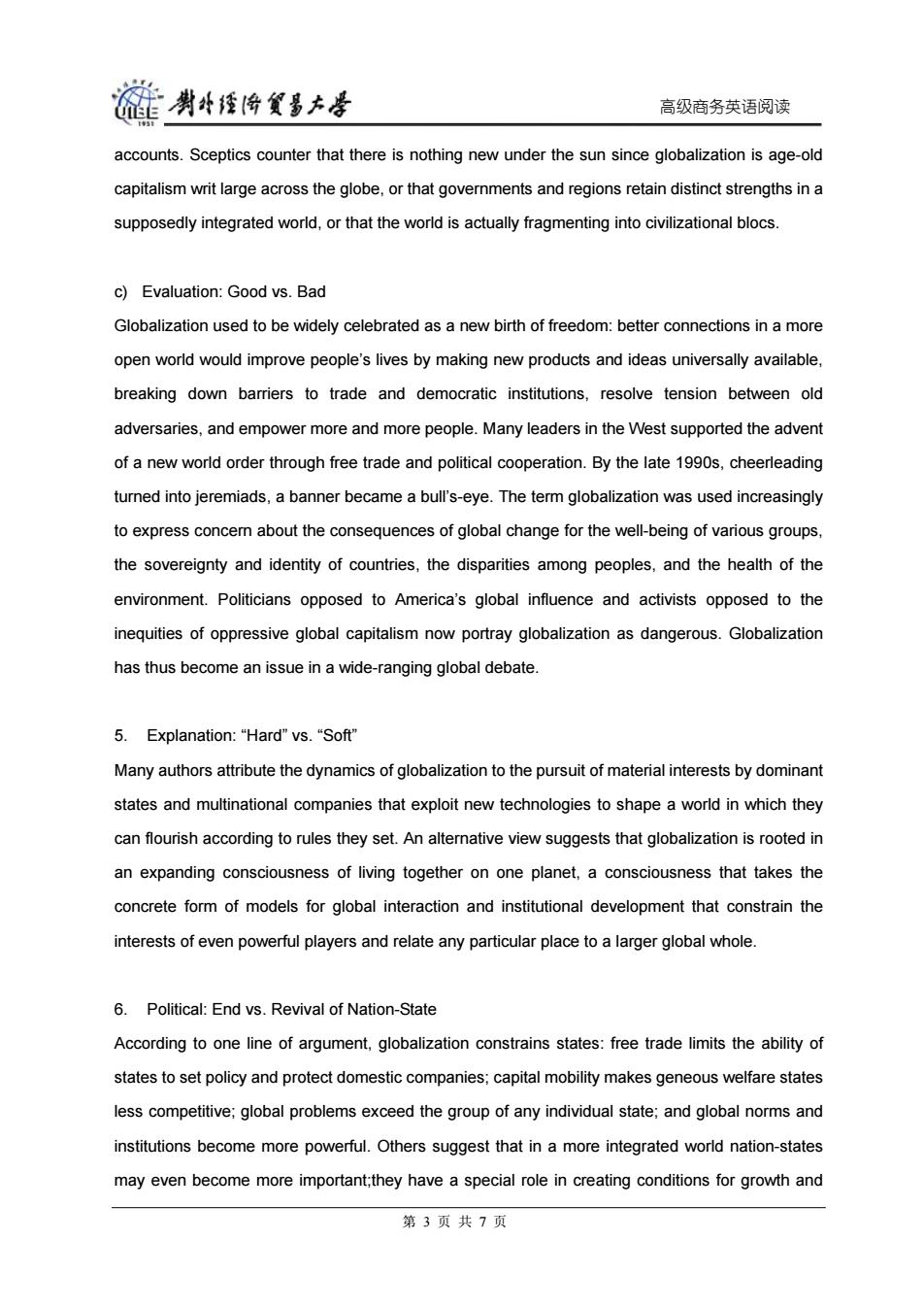正在加载图片...

碰男将多大是 高级商务英语阅读 accounts.Sceptics counter that there is nothing new under the sun since globalization is age-old capitalism writ large across the globe,or that governments and regions retain distinct strengths in a supposedly integrated world,or that the world is actually fragmenting into civilizational blocs. c)Evaluation:Good vs.Bad Globalization used to be widely celebrated as a new birth of freedom:better connections in a more open world would improve people's lives by making new products and ideas universally available, breaking down barriers to trade and democratic institutions,resolve tension between old adversaries,and empower more and more people.Many leaders in the West supported the advent of a new world order through free trade and political cooperation.By the late 1990s,cheerleading turned into jeremiads,a banner became a bull's-eye.The term globalization was used increasingly to express concern about the consequences of global change for the well-being of various groups. the sovereignty and identity of countries,the disparities among peoples,and the health of the environment.Politicians opposed to America's global influence and activists opposed to the inequities of oppressive global capitalism now portray globalization as dangerous.Globalization has thus become an issue in a wide-ranging global debate. 5.Explanation:“Hard"vs.“Soft" Many authors attribute the dynamics of globalization to the pursuit of material interests by dominant states and multinational companies that exploit new technologies to shape a world in which they can flourish according to rules they set.An alternative view suggests that globalization is rooted in an expanding consciousness of living together on one planet,a consciousness that takes the concrete form of models for global interaction and institutional development that constrain the interests of even powerful players and relate any particular place to a larger global whole. 6.Political:End vs.Revival of Nation-State According to one line of argument,globalization constrains states:free trade limits the ability of states to set policy and protect domestic companies;capital mobility makes geneous welfare states less competitive;global problems exceed the group of any individual state;and global norms and institutions become more powerful.Others suggest that in a more integrated world nation-states may even become more important;they have a special role in creating conditions for growth and 第3页共7页高级商务英语阅读 accounts. Sceptics counter that there is nothing new under the sun since globalization is age-old capitalism writ large across the globe, or that governments and regions retain distinct strengths in a supposedly integrated world, or that the world is actually fragmenting into civilizational blocs. c) Evaluation: Good vs. Bad Globalization used to be widely celebrated as a new birth of freedom: better connections in a more open world would improve people’s lives by making new products and ideas universally available, breaking down barriers to trade and democratic institutions, resolve tension between old adversaries, and empower more and more people. Many leaders in the West supported the advent of a new world order through free trade and political cooperation. By the late 1990s, cheerleading turned into jeremiads, a banner became a bull’s-eye. The term globalization was used increasingly to express concern about the consequences of global change for the well-being of various groups, the sovereignty and identity of countries, the disparities among peoples, and the health of the environment. Politicians opposed to America’s global influence and activists opposed to the inequities of oppressive global capitalism now portray globalization as dangerous. Globalization has thus become an issue in a wide-ranging global debate. 5. Explanation: “Hard” vs. “Soft” Many authors attribute the dynamics of globalization to the pursuit of material interests by dominant states and multinational companies that exploit new technologies to shape a world in which they can flourish according to rules they set. An alternative view suggests that globalization is rooted in an expanding consciousness of living together on one planet, a consciousness that takes the concrete form of models for global interaction and institutional development that constrain the interests of even powerful players and relate any particular place to a larger global whole. 6. Political: End vs. Revival of Nation-State According to one line of argument, globalization constrains states: free trade limits the ability of states to set policy and protect domestic companies; capital mobility makes geneous welfare states less competitive; global problems exceed the group of any individual state; and global norms and institutions become more powerful. Others suggest that in a more integrated world nation-states may even become more important;they have a special role in creating conditions for growth and 第 3 页 共 7 页